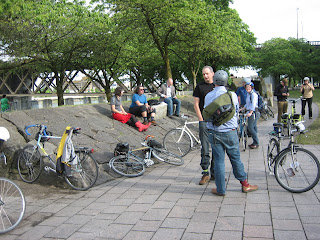 The ride was called "The Future of News," and it was hosted by Oregon Humanities (incidentally, I applied, unsuccessfully, for a job here). The main issue confronting the participants concerned the continuum between news that many people care a little about and news that a few people care very much about. In our age of modern media, we forget that people used to have to WAIT for it to come to them, and they didn't have much of an option about what it contained when it got there. However, the simplicity of a packet of pages in the form of newspapers, magazines and personal correspondence arriving once a day on my door step is pretty appealing.
The ride was called "The Future of News," and it was hosted by Oregon Humanities (incidentally, I applied, unsuccessfully, for a job here). The main issue confronting the participants concerned the continuum between news that many people care a little about and news that a few people care very much about. In our age of modern media, we forget that people used to have to WAIT for it to come to them, and they didn't have much of an option about what it contained when it got there. However, the simplicity of a packet of pages in the form of newspapers, magazines and personal correspondence arriving once a day on my door step is pretty appealing.We met at the Japanese American Historical Plaza down on the SW waterfront to begin the ride. Several bike participants had already arrived, and I didn't have much time before we commenced. Annie Kaffen of Oregon Humanities hosted the ride, and Michael Anderson, editor of Portland Afoot, was our tour guide.
The ride consisted of 3-4 stops concerning the history of media in PDX, and we stuck to this schedule, other than being hustled off the Unitus Plaza. The first stop was the location of the first printing of The Oregonian on December 4, 1850. We discussed the expense of buying a printing press and challenges of disseminating the same news to a lot of people. The time arrived to pedal onwards to the current location of The Oregonian, which was established in 1950.
After being unceremoniously ushered away from the banking plaza, we convened in the parking garage of The Oregonian. Apparently banks get twitchy when you start to occupy their space. I must concede, this was my first participation in the Occupy movement. I'm glad it didn't move beyond our constitutional right to gather and speak freely and our Portland right to pedal.
What did people care about in 1950? The age of mass production and consumerism: suburbs, schools, media. We pretty much cared about the same thing as in 1850, 1950, and 2012. Here they are in order of importance.
1. My family and friends.
2. My job
3. My hobbies, sports teams
4. My community
5. My civic government
Soon we pedaled over to Big Pink to discuss current changes in our consumption of media. Revenue for major publications is down by 50% in the last 5 years, yet our media options have increased exponentially. We now have Facebook, Twitter, WordPress, Blogs, Willamette Week, Mercury, Bike PDX, OPB, just to name a few very specific ones. The small and passionate have replaced the big and shallow. What does that mean? How does it change the way we consume the news?
My biggest take-a-way from the discussion concerned my own personal news consumption. I pick and choose what I read. I'm pretty sure I read more than the average bear, but it's still filtered through my own choices. I choose to go to NYtimes, The Onion, Jon Stewart, OPB, my friends' Facebook pages. I rarely choose to go elsewhere. My parents choose to go to the Wall Street Journal, Fox News, Rush Limbaugh (gag me). The idea that I'm only consuming the deep and narrow bothers me. But I don't know what media outlet is going to provide the broad and shallow. The character in The Golden Notebook basically has a nervous breakdown because of this same issue! She was in London in 1950s. It's overwhelming the amount of information we have at our fingertips, and yet I feel inadequate about my breadth of knowledge. I guess it's time to stop contributing to this pile of words and go for a bike ride.


No comments:
Post a Comment